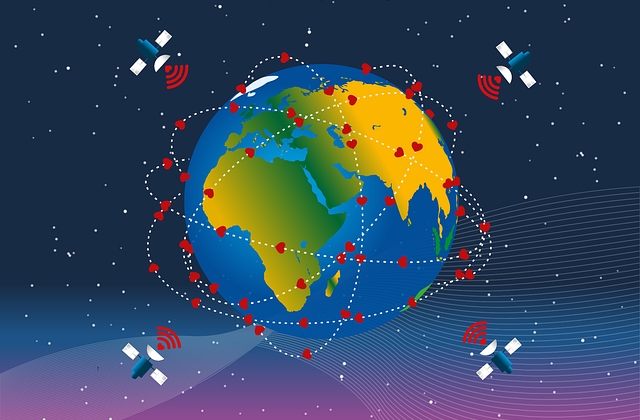Amazon is planning to launch and operate its own internet satellites next year, and it has already asked the U.S. Federal Communications Commission for approval. The e-commerce and tech company is applying for two prototype internet satellites so it can build a space-based satellite network.
The company's application for the approval of internet satellite launch and operation was revealed on Monday, Nov. 1. According to Reuters, Amazon committed to investing at least $10 billion to make 3,236 satellites through its Project Kuiper program.
Jeff Bezos' firm stated that the trial and demonstration launch is a crucial step toward its aim of offering high-capacity, low latency broadband services to millions of "unserved and underserved consumers and businesses." Amazon said it would continue to invest in the project as they are approaching the full production stage and getting ready to serve customers worldwide.
It was reported that Amazon's Project Kuiper was approved by the FCC in 2020, and the plan is to build the constellation of low-Earth orbit satellites that will rival Elon Musk's Starlink satellite network. Bezos and Musk are two of the richest people in the world, and they are also big rivals in the space and aeronautics business, and now they are also set to compete in the internet satellite biz.
CNBC reported that Project Kuiper is expecting to launch the internet satellites in the fourth quarter of 2022. The first two prototypes, called the KuiperSat-1 and KuiperSat-2, are the first to be deployed into orbit. These satellites are going to be brought beyond the skies with ABL Space on its RS1 rocket.
"We have invented lots of new technology to meet our cost and performance targets for Project Kuiper," Rajeev Badyal, Amazon's vice president of technology, said in a press release. "All of the systems are testing well in simulated and lab settings, and we'll soon be ready to see how they perform in space. There is no substitute for on-orbit testing, and we expect to learn a lot given the complexity and risk of operating in such a challenging environment. We can't wait to get started."
Finally, Amazon is looking to begin offering early service once it has placed 578 satellites in orbit. Kuiper is expected to clash with SpaceX's Starlink network in this new generation of broadband satellite systems.



 Japanese Pharmaceutical Stocks Slide as TrumpRx.gov Launch Sparks Market Concerns
Japanese Pharmaceutical Stocks Slide as TrumpRx.gov Launch Sparks Market Concerns  SpaceX Prioritizes Moon Mission Before Mars as Starship Development Accelerates
SpaceX Prioritizes Moon Mission Before Mars as Starship Development Accelerates  Ford and Geely Explore Strategic Manufacturing Partnership in Europe
Ford and Geely Explore Strategic Manufacturing Partnership in Europe  Silver Prices Plunge in Asian Trade as Dollar Strength Triggers Fresh Precious Metals Sell-Off
Silver Prices Plunge in Asian Trade as Dollar Strength Triggers Fresh Precious Metals Sell-Off  Thailand Inflation Remains Negative for 10th Straight Month in January
Thailand Inflation Remains Negative for 10th Straight Month in January  Vietnam’s Trade Surplus With US Jumps as Exports Surge and China Imports Hit Record
Vietnam’s Trade Surplus With US Jumps as Exports Surge and China Imports Hit Record  CK Hutchison Launches Arbitration After Panama Court Revokes Canal Port Licences
CK Hutchison Launches Arbitration After Panama Court Revokes Canal Port Licences  Tencent Shares Slide After WeChat Restricts YuanBao AI Promotional Links
Tencent Shares Slide After WeChat Restricts YuanBao AI Promotional Links  Washington Post Publisher Will Lewis Steps Down After Layoffs
Washington Post Publisher Will Lewis Steps Down After Layoffs  Prudential Financial Reports Higher Q4 Profit on Strong Underwriting and Investment Gains
Prudential Financial Reports Higher Q4 Profit on Strong Underwriting and Investment Gains  Toyota’s Surprise CEO Change Signals Strategic Shift Amid Global Auto Turmoil
Toyota’s Surprise CEO Change Signals Strategic Shift Amid Global Auto Turmoil  South Korea Assures U.S. on Trade Deal Commitments Amid Tariff Concerns
South Korea Assures U.S. on Trade Deal Commitments Amid Tariff Concerns  South Korea’s Weak Won Struggles as Retail Investors Pour Money Into U.S. Stocks
South Korea’s Weak Won Struggles as Retail Investors Pour Money Into U.S. Stocks  OpenAI Expands Enterprise AI Strategy With Major Hiring Push Ahead of New Business Offering
OpenAI Expands Enterprise AI Strategy With Major Hiring Push Ahead of New Business Offering  Asian Stocks Slip as Tech Rout Deepens, Japan Steadies Ahead of Election
Asian Stocks Slip as Tech Rout Deepens, Japan Steadies Ahead of Election  Rio Tinto Shares Hit Record High After Ending Glencore Merger Talks
Rio Tinto Shares Hit Record High After Ending Glencore Merger Talks  Alphabet’s Massive AI Spending Surge Signals Confidence in Google’s Growth Engine
Alphabet’s Massive AI Spending Surge Signals Confidence in Google’s Growth Engine 































